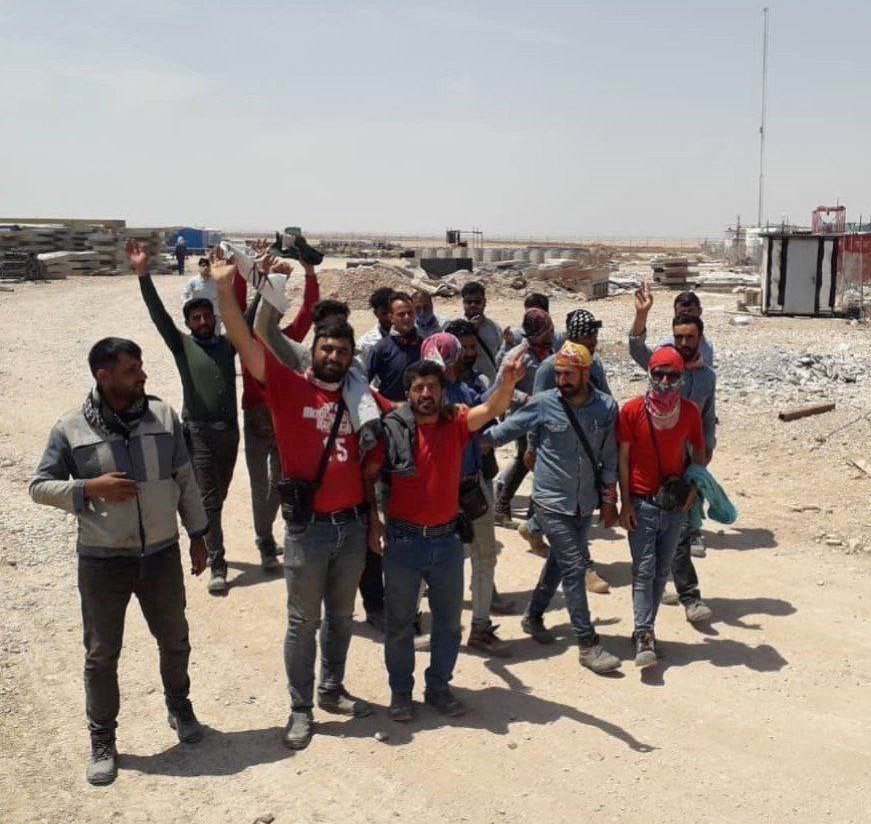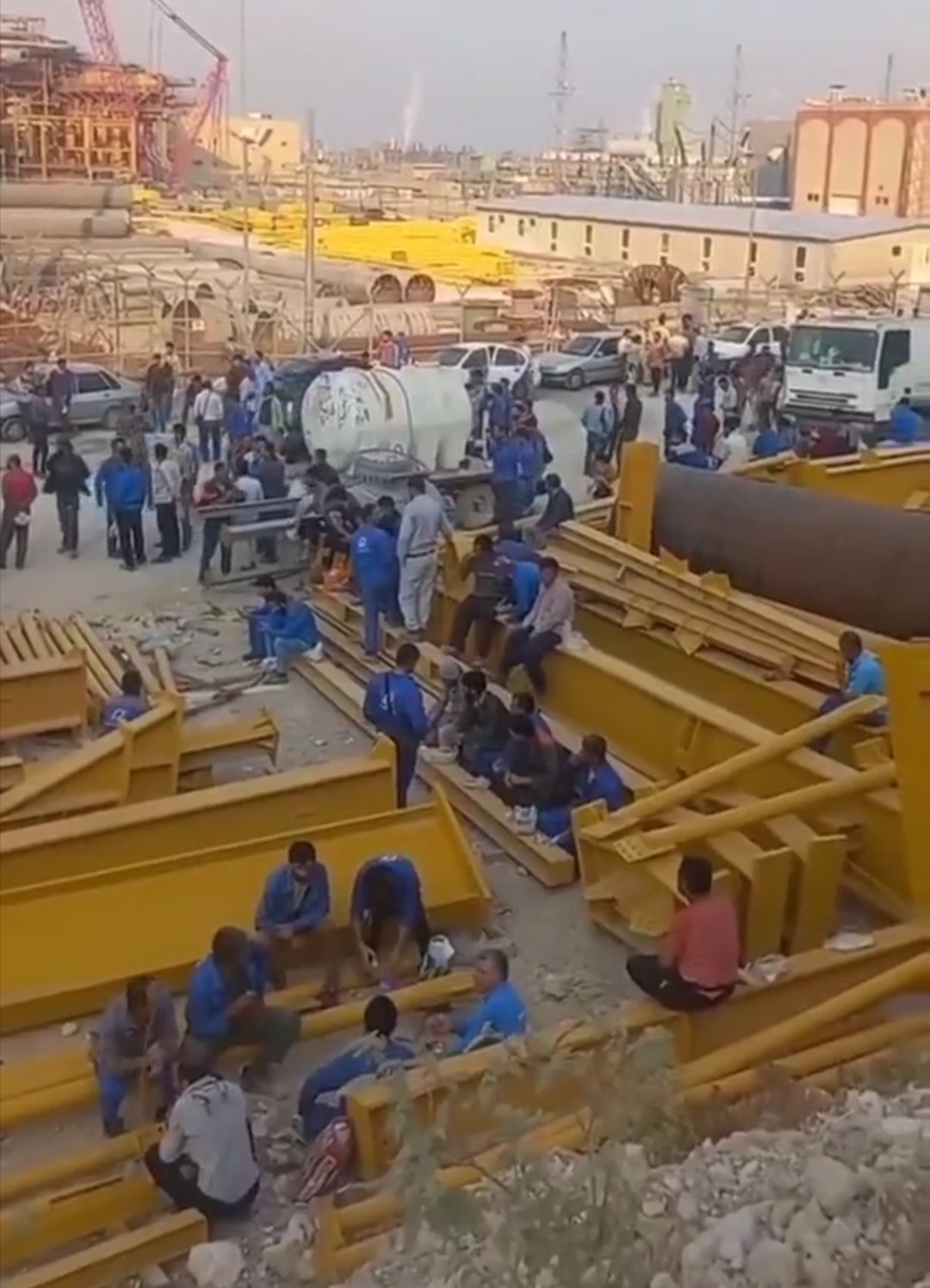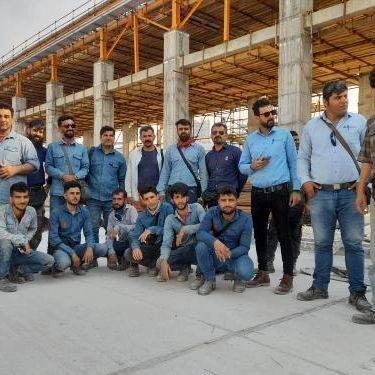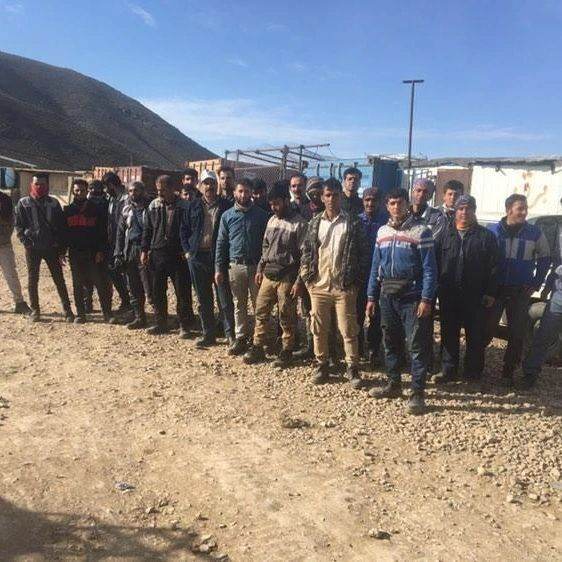
In less than a week, a nationwide strike has broken out across Iran. Beginning on 21 April, with 18 workplaces affected in the oil-gas sector, it has now spread to now involve over 100 workplaces across the mining, steel and oil-gas sectors. The strikes began in the oil-rich province of Khuzestan, but they rapidly spread to Bushehr, Fars, Kerman, Isfahan, Kerman and Yazd province.
The initial strikes were called by the ‘Council for Organising Protests of Oil Contract Workers’, an independent workers’ organisation that has previously led nationwide strikes in 2021 and 2020. It even attempted to spark a political general strike during the uprising last year. The Council published the following statement on the launch of its campaign:
“We declare that we will continue our strikes so long as our wage demand and our demand for twenty days of work and ten days of rest, which are a physical and social necessity, remain unanswered. The Council for Organising Protests of Oil Contract Workers calls all project colleagues working throughout the oil, gas and petrochemical centres to join the strikes, in unity and solidarity with those who initiated them.
“Comrades on strike and gathering in rallies are two complementary components of the movement. We have the experience of the past two years.
“We must maintain a united front in order to stand firm against attempts from above, the experience of the Hefeshjan General Assembly of last year is a good lesson and model for preparing our meetings and a permanent consensus on how to continue our strikes.”
The demands of 10 days of rest a month, a 79 percent wage increase, and a minimum wage of 20 million tomans struck a chord not only in the oil-gas sector, but across the whole working class. The working class is simmering with anger, and for five years we’ve seen wave after wave of strikes and protests amidst overwhelming poverty and repression.

As the strike has expanded, so too have its demands, which now include: improved health and safety at work; improved quality of commuter services; dormitories and canteens; improvement in the quality of food; the payment of insurance premiums according to the workers’ job titles; the reduction of the daily hours of labour from 10 to 8 hours; the removal of 15-day unpaid trial periods before full employment commences, and the removal of clauses from labour contracts prohibiting workers from protesting against their conditions. Already, the national strike has inspired other sectors to call for protests over economic demands, including nurses, retirees and others.
In the oil sector in Khuzestan and Bushehr, the capitalist class has attempted to divide the workers on ethnic lines of immigrant versus native-born. These are the same methods that were used to defeat previous strikes.The Oil Contract Workers have responded to these attempts in the following statement:
“Be aware of attempts to sow division.
“The strike of our oil project workers remains strong and, fortunately, more and more colleagues are joining the strike daily.
“But in the meantime, as on previous occasions, backward methods and reactionary propaganda are being used to distort the atmosphere of the protests and to cause division in the protesting ranks of the workers, who must be vigilant against such efforts. Examples include the dispersal of workers’ picket lines in some areas in the name of the Bakhtiari [an ethnic group], Bumi [locals], etc.
“In the meantime, all of us as workers, from every part of the country, suffer common pains and have common enemies. All of us are protesting against the poverty and rising cost of daily life, and worsening working and living conditions every day. What unites us today are the common urgent demands that we have gathered around, such as that for a 79 percent increase in wages, twenty days of work and ten days of rest.
“At the same time, we stand proud in the face of the tyranny of the contractors and the slave laws of the special economic zones, and we aim to dismantle the contractors and free ourselves from the slave laws ruling in these regions. If today we are able to fulfil our two urgent demands through the power of our unity, we will be all the more powerful if we choose to continue the struggle to dismantle the contractors.
“While we as workers have been in preparation for a long time for strike action, and have raised our voice of protest against the worsening of our working and living conditions, there are movements talking about “campaigns” that attempt to curb our protests and smother our anger towards the employers and the government. They say that after this “campaign”, there will be no more summer strikes as we’ve seen in recent years. It is clear that behind such statements stand the aforementioned forces. We firmly declare that we will not be slaves to someone else who claims to speak with our voice.
“We push these demands we announce today, whilst our other demands have yet to be answered, but which we continue to pursue. We will stand firm against any aggression, at any stage, when it proves necessary. Our warning to our comrades is to be wary of this type of intrigue.”
The pressure against the strike will only intensify. The oil workers are building upon experience by correctly calling for the formation of strike committees and politically winning over the permanently employed oil workers. But this is only a first step. The regime will use the same method it has previously deployed. They will draw out the strike, putting enormous economic pressure upon the workers, and attempting to divide workers on ethnic lines, contract versus full-time employee, and so on. The regime might even be willing to offer empty promises to a section of workers to lull them into a sense of having achieved a partial victory, only to later begin a campaign of arrests against militants.
Yesterday, the Council for Organising Protests of Oil Contract Workers called for national protests and strikes on May day in the following statement:
“We are approaching 1 May, International Workers’ Day.
“This is the day of solidarity and unity, and the day of struggle against the system that blindly leads us to an unequal war for survival.
“It is a system that has destroyed the lives and livelihoods of ourselves and our families with low wages, delayed payment of wages, insecure working environments, insufficient health insurance, temporary contracts and dozens of other inhuman means.
“This year, International Workers’ Day has a special significance compared to previous years. This difference is on account of the continuation of the movement, and of the revolution for ‘women, life, freedom’. This is a revolution of liberation, in which we, the workers, are a main pillar.
“Our words are those of society. We have always followed up on our demands. We have called out the wishes of society and the pain of the people. Our emphasis remains on the important provisions of the charter of minimum demands of twenty organisations, of which we were one of the signatories.
“We, the workers, have always pressed for freedom of expression, to protest and to strike without any restrictions. We have demanded an end to all oppression, and humiliation and discrimination against women. We have called the hijab a means of suppressing the whole of society. We have expressed our opposition to the death penalty. We consider the rights of all citizens to be equal, irrespective of gender, ethnicity, or religious belief. We have made clear that we will not submit to the exercise of power over our heads in any form, whether in the workplace or in life and in society.
“To fulfil our wishes, we consider the best form of community administration to be council administration and the exercise of the collective will. These are all our commonalities with the ‘women, life, freedom’ movement, which is completely opposed to any discrimination, exploitation, subjugation or class oppression. Let us announce together, on the occasion of May Day now more than ever, our determination to end more than one hundred years of slavery and oppression of workers and of the whole of society.
“Friends! Presently, a large part of our project partners are engaged in a powerful and widespread strike. We will enter the strike with strength. Now, thousands of us are on strike in nearly 100 centres, companies, workshops and complexes. We have initiated a large and widespread movement for wages: a movement against poverty, discrimination and exploitation, that has forced us to live a life below human dignity. This movement must not remain at this level. The demand that we as project workers propose, is the demand of all workers. Our call to all sectors and all workers in oil and other industries is to join this huge movement of struggle for wages, through the means of powerful nationwide protests.
“We will end this suppression of workers’ wages, as approved by the Supreme Labor Council. Besides the fact that our third party and official comrades have unanswered demands outstanding, in pursuit of our demands the strike can form the basis for oil workers to join hands in a nationwide strike to remove these arrogant contractors and end the atmosphere of oil barracks. Let us come to the square with greater strength and be the voice of protest for all workers and all people against poverty, slavery and insecurity.
“We workers suffer pains at the national level. Let us strike a more effective blow against the roots of the prevailing oppression with our means of nationwide strikes. Another important point, on the occasion of International Workers’ Day, is to emphasise the demands for the immediate release of imprisoned workers and those arrested during the eight-month revolution, and indeed all political prisoners. With our cry to free the political prisoners, we must emphasise the immediate and unconditional release of every one of them. 1 May, International Workers’ Day, is the day of national protest of all workers and all peoples. On the eve of this day, all sections of society should shout their demands to end all slavery and exploitation by holding passionate gatherings. We must welcome the dawn of this great day.
“Long live 1 May, International Workers’ Day Council – organising protests of oil contract workers 27 April, 1402.”
This is precisely the way forward. In order to avoid repeating past defeats, the national strike must be transformed into a general strike for the common demands of the entire working class. The local strike committees must immediately link up on a national scale and begin a campaign to draw further layers of the working class into the struggle.
Ripe for a general strike
Despite the defeat of last year’s youth uprising, the regime is unable to bask in its victory. It has failed to quell the revolutionary radicalisation in society, despite its campaign of terror directed against the revolutionary youth and independent trade unionists. Despite the poisoning of food at universities and high schools to instill fear, the continued arrests, and the near-constant reports of executions and torture following uprising; the radicalisation of the workers and youth continues.

The working class did not participate en masse in the uprising, as it did not see a clear alternative to the regime but only the hypocritical liberal-monarchist opposition that broadcast its message into Iran from exile on all non-regime affiliated media. In fact, with a few exceptions, the strike movement came to a halt during the uprising. But now workers are making their demands heard once more.
The economic crisis has rapidly accelerated, with the worldwide inflationary crisis putting enormous strain on Iran’s already crisis-ridden economy. Higher foreign interest rates and the strengthening of the dollar have further depleted the regime’s limited currency reserves. The toman has lost half its value in a year. Most ridiculously of all, Iran is facing a natural gas and energy shortage, despite having the second largest gas reserves in the world. This is a testament to the parasitism of the ruling class.
For many layers within the Iranian working class, which was already nearing boiling point, the tipping point has been the regime’s pathetic minimum wage rise of 27 percent for the new year [20 March]. Since the beginning of the Iranian year, there have been over 130 sporadic strikes, which have thus prepared the way for the current nationwide strike wave. Already, strike action has extended beyond the oil-gas sector, with unprecedented anger against the regime carrying much further.
Workers and youth unite!
The revolutionary youth organisations, which in previous months have attempted to resurrect the uprising using every atrocity to call for protests, have met with barren results. Now, with the outbreak of this strike, the youth are turning towards the working class with statements of solidarity and calls for action. Revolutionary youth groups from more than 32 cities have signed the following statement:
“We should fully support the strikes of the workers led by the oil and petrochemical workers!
“We are groups and organisations of students, women and youth who are on strike with oil, petrochemical and steel workers.
“We, as student organisations, and youth and women’s urban struggle groups, who have been fighting the Islamic Republic day after day in the streets, schools and universities, and have advanced our revolution, are with you, oil, petrochemical, steel and other striking workers. We express our complete solidarity.
“We announce that a huge part of the student movement, the powerful movement of women and youth, stand with you, and consider ourselves your ally.
“The only solution for the liberation of ourselves, the people suffering under exploitation, oppression and deprivation, is to take swifter, more effective, nationwide steps to organise the overthrow of the Islamic Republic.
“These steps must be indefinite, united national protests and national strikes, and a general strike across society.
“Long live you, the revolutionary workers. Long live the ‘woman, life, freedom’ revolution.”
“The Islamic Republic must be destroyed!
“No to exploitation, poverty and oppression!
“Long live the women, life, freedom revolution!
“Freedom and equality, shurah rule!”
The most advanced layers of the youth – the socialists and communists – have gone much further. At universities, communist posters are being pasted up, with one such poster saying the following: “Socialism forever”; “Bread, work, freedom – shurah [soviet] rule”; and, “The only salvation is the armed uprising of the Iranian masses”. Some have even begun leafleting in support of the strike. One such group, Peykar [named after the defunct organisation of the same name], correctly links the economic struggle to the struggle against the regime:
“By supporting the strike of contract oil and petrochemical workers, let us welcome the first of May!
“International Workers’ Day, the commemoration of the unity and historical class struggle for the world proletariat against exploitation is coming. But this year it arrives in a situation where we Iranian workers are in an ‘unofficial’ state of class war! By approving the minimum wage increase bill, despite rampant inflation, the government has declared itself the guarantor and natural representative of the interests of the capitalists! Approving the ‘productivity’ plan for the purpose of privatising national funds and services, international trade agreements, and the injection of foreign currency will have no result other than making the capitalists richer and ourselves poorer.
“In addition, the increase in fuel prices, under the expression ‘liberalisation’, and the inevitable inflation that will flow from it, will bring the living situation to an unbearable point. Our struggle as workers is now no longer limited to a fight for our basic rights, and for a ‘dignified life’ under this social order based on exploitation!
“We do not forget the shooting of union protests, the whipping of our comrades in the factories, and the decades of imprisonment and torture of labour activists. And we know very well that the machine of exploitation shows only two ways: either we must go head as slaves and focus only on producing profits to keep the wheel of exploitation turning, or else we must answer bullets and arrests with protests and strikes!

“The national uprising of the past months and the selfless struggle of the people clearly showed that an honourable life without inequality and tyranny is only possible by linking various struggles against the different layers of oppression. If we want to one day end this gradual death, we have to continue the struggle in the factories and streets, and plan a new path towards collective happiness. That way begins with the unification of the numberless ranks of the workers and toilers; by stopping the wheels of production; by joining the selfless struggle of women and oppressed nations to get rid of inequality, humiliation and exploitation, and for a free and equal life. We base ourselves on our common interests, and the idea that the human beings of this land have the right to welfare, the right to intervene and make decisions, the right to human dignity, to determine their own destiny and life.
“Our union with each other – in industrial zones, in small and large factories and workshops, forming workplace committees and councils, and organising strikes – is a fundamental step on this path. Whatever form our struggles takes – be they at schools where we fight for the equal rights of the people of tomorrow’s society, or strikes in workplaces for decent living conditions – they are the same struggles. Whether it is to retrieve our trampled rights, or a political warning to the government, the expansion and spread of mass strikes by oil and petrochemical contract workers since the first day of farvardin [21 April] is a turning point in the organised struggle of workers against the unbridled invasion of the capitalists and of their government. In the case of wider and nationwide support from the workers, it could mark another historical experience in our struggle.
“Long live the strike, long live the revolution!
“Long live 1 May, International Workers’ Day!”
These methods are the way forward for the revolutionary movement: linking the economic struggle of the working class to the overthrow of the regime. They show that the revolutionary youth have the potential to play an important role in transforming the national strike into a revolutionary mass movement of the entire working class.
The Islamic Republic must be destroyed! For a revolutionary leadership!
After five years of nationwide strikes and multiple uprisings, the conditions are not only ripe for a nationwide strike but are ripe to prepare the way for the overthrow of the Islamic Republic. It is growingly clear to the Iranian masses that the regime has nothing to offer but poverty and terror. Any concessions from the regime will be temporary at best and will only be used to buy time in order to arrest revolutionary workers.
The main thing holding back the revolutionary movement is the absence of a clear revolutionary leadership with a programme that could unite the masses, linking the economic and political demands and presenting itself as a clear working-class alternative to the regime, as well as to the reactionary, western-backed opposition. Already, the national strike has laid the foundation for advancing many of the economic demands. But this must be further developed to bring more layers of the working class into the struggle. This could include, among other demands, the reversal of all austerity measures; an extensive programme of public works to repair and develop the country’s crumbling infrastructure; the renationalisation of all privatised companies under workers’ control; and the introduction of workers’ control throughout the state-owned economy.
Such a programme would find mass support and turn the national strike into a general strike. But to realise these demands, it is also necessary to pose the question of abolishing the Islamic Republic. A mass movement that draws in the mass of the working class and broad layers of the oppressed, would be a first step towards the socialist revolution in Iran – the only guarantee for a decent, dignified life for all, and a beacon for the workers of the whole world.

